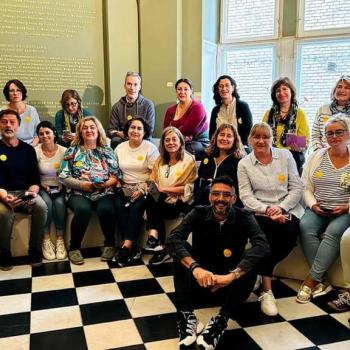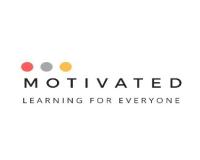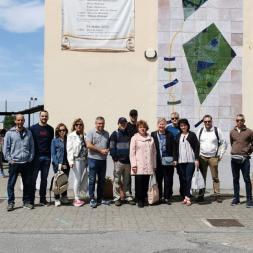
“Climate Change and Sustainable Development Goals: Small Acts Create Huge Impact - Take Action: Go Green”
Raise the environmental awareness of teachers, school managers and other school staff to encourage them to engage in environmentally responsible practices and operations; Develop an audit tool for assessing specific teaching gaps and to identify and analyse the teaching needs of the target group related to the design and implementation of innovative environmental-friendly process at school.
Description
Activity / task 1: Module 1: Introduction
- HOW ESTABLISH A SCHOOL CULTURE OF SUSTAINABILITY;
- SUSTAINABLE EDUCATIONAL GOALS (SDG’s): Overview;
- Climate Change Education in Schools;
- 2021-2027 - EU Budget for Climate Change;
- UNESCO moving forward the 2030 Agenda for Sustainable Development
Activity / task 2: Module 2: Workshop
- TEACHING SUSTAINABLE DEVELOPMENT AND CLIMATE CHANGE IN ALL SUBJECT AREAS: TEACHING, LEARNING, ASSESSMENTS;
- Template of School’s Climate Action Plan
Activity / task 3: Module 3: Workshop
- Climate change: Six everyday things you can do to help stop global warming;
- 8 things schools can do to tackle the climate crisis
Activity / task 4: Module 4: TEACHING SUSTAINABLE DEVELOPMENT AND CLIMATE CHANGE IN ALL SUBJECT AREAS: TEACHING, LEARNING, ASSESSMENTS
- Subject and Examples;
- Creating concept maps and portfolios;
- Conducting one-on-one or group interviews;
- Writing journals;
- Making projects;
- Recording observations
Activity / task 5: Module 5: Workshop
- BECOMING A GREEN, CLIMATE-FRIENDLY, ECO-FRIENDLY SCHOOL;
- LOCAL COMMUNITY AS A CLASSROOM;
- Learning relevant to life
Activity / task 6: Module 6: Workshop
- TAKING ACTION ON REAL-LIFE SUSTAINABLE DEVELOPMENT AND CLIMATE CHANGE: Top 10 Solutions to Reverse the Climate Change
- Unleashing the creativity of teachers and students to combat climate change
Activity / task 7: Module 7: Workshop
- TAKING ACTION ON REAL-LIFE SUSTAINABLE DEVELOPMENT AND CLIMATE ISSUES: Learning about, through and from action.
- Feedback, course evaluation. Delivery of certificates
Learning objectives
Outcome 1: Awareness of Cultural Sustainability: Developing values that support a sustainability ethos, working toward sustainability in partnership with their local communities and school authorities and ensuring students share ownership of sustainability initiatives and decision making; Urging everyone in school community to take part in making the school sustainable; Reinforcing expectations for sustainable, climate-friendly behavior by celebrating appropriate actions and treating others with respect.
Outcome 2: Sustainability Assessment: Carrying out assessments (such as waste and energy audits) to measure school’s progress in becoming more sustainable; Identifying local sustainable development issues that the school could tackle.
Outcome 3: Cultivation of Environmental Awareness: Enhance creativity and social environmental responsibility; Providing practical tools to deal with difficult environmental problems at school
Outcome 4: Climate Crisis Awareness Mentoring younger students who are just learning how to take part in climate action; Sharing technical expertise about sustainable development and climate change; Integrating students’ critical thinking and creative behavior about the climate crisis into classroom activities; Discover and use effective tools that can help to address the climate crisis in the classroom.
Outcome 5: Education for Sustainable Development (ESD); Identifying and promoting learning resources to support Education for Sustainable Development (ESD); Integrating ESD into the curricula; Strengthening cooperation on ESD regionally, nationally and internationally; Fostering interdisciplinary learning about sustainable development by transforming school timetables; Actively engaging in a continuous cycle of planning, implementing and reviewing approaches to sustainability as part of everyday school operations.
Outcome 6: Professional skills: Develop teaching professional skills, trying to be "an effective model of competence"; Acquire shared leadership and group integrity; Learning to learn competence; Integrate 21st century skills and content in instruction; Using new technologies which are rich sources of learning and learning materials, and can generate ideas and solutions; Encouraging students to search and make use of resources beyond the classroom and the school; Provide knowledge and skills with a positive attitude towards innovations, feel the necessity for self-education, and adopt a student-centered teaching approach; Fostering interdisciplinary learning about sustainable development by transforming school timetables; Carrying out assessments (such as waste and energy audits) to measure school’s progress in becoming more sustainable; Discover and use effective tools that can help to address the climate crisis in the classroom; Identifying local sustainable development issues that the school could tackle; Development of participants’ knowledge, skills and competencies related to sustainability; Increased knowledge of methodology and a framework for teaching Climate Change and Go Green school and society; Deeper understanding on Sustainability and Climate Change and how to approach it in the classroom; Improved sense of international cooperation; Gain broader understanding of practices, policies and systems of education of different countries, cultivate mutual respect, intercultural awareness and embed common educational and training values; Broader understanding of practices, policies and systems on environment and sustainability education in Europe; Increased awareness of the link between environmental and social phenomena; Knowing practical tools suitable for teaching the subject, including visual tools, Internet and multimedia; Actively engaging in a continuous cycle of planning, implementing and reviewing approaches to sustainability as part of everyday school operations.
Methodology & assessment
Materials, digital tools & other learning resources
Before the course begins, participants will be provided with information about the materials, digital tools, and other learning resources that will assist them with completing course tasks. They will be able to communicate with us as course organisers regularly via email, WhatsApp, and Zoom, where online meetings will be conducted.
Certification details
At the end of the course, each participant will be awarded a Certificate of Attendance along with Europass Mobility Certificate.
Our certificates are in line with the Erasmus Quality Standards and so include the course's title, short description of its learning outcomes (if requested), dates, venue, the name of the course provider and the course director, number of training hours.
We support participants in every step of certification and validation of learning outcomes with specific focus on Euro
Pricing, packages and other information
-
Price:560Euro
-
Course package content:
Course fee is fixed at 80.00 € per course day per participant. The total amount of the course fee depends on the length of the training course abroad and includes: tuition fee, conference hall rental and audiovisual equipment, wi-fi internet, stationary and course materials, course documents - we will send participants the filled-out templates of Learning Agreement and Europass Mobility, coffee/tea breaks, cultural activities – sightseeing, for one or two days depending on the duration of the tr
-
Additional information:Description of the services and activities included in the course package (such as accommodation, meals, transport) or available at extra cost.
-
Cancellation & changes:
NGO “Motivated Learning for Everyone” is not liable for any already paid by participants expenses caused by a case of force majeure circumstances that prevent participants from attending the course. If flights are cancelled for any reason, NGO “Motivated Learning for Everyone”, as the course provider, is not responsible for the financial or other consequences concerning travel and accommodation or registered participants. If unable to attend, the registered person may substitute someone else fro
-
Additional information:The options and conditions for change and cancellation, and the policy in case of unforeseen circumstances (force majeure).
Additional information
-
Language:English
-
Target audience ISCED:Primary education (ISCED 1)Lower secondary education (ISCED 2)Upper secondary education (ISCED 3)
-
Target audience type:TeacherHead Teacher / PrincipalOther
-
Learning time:25 hours or more
Upcoming sessions
Past sessions
More courses by this organiser
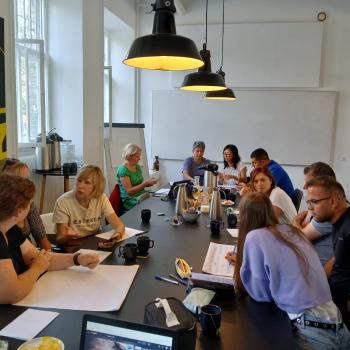
EMERGING MODELS IN EDUCATION: FLEXIBILITY, INNOVATION, COLLABORATION
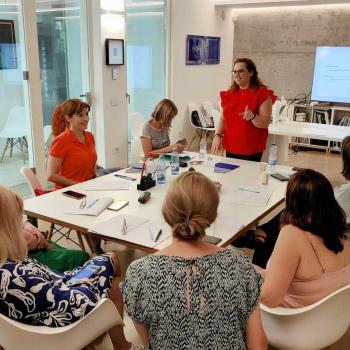
“MENTORING SKILLS FOR CAREER DEVELOPMENT”
